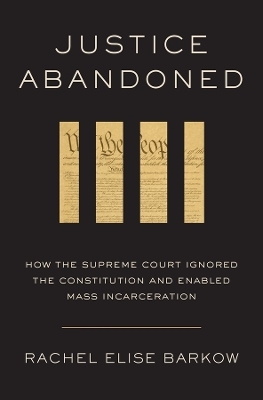
Justice Abandoned
How the Supreme Court Ignored the Constitution and Enabled Mass Incarceration
Seiten
2025
Harvard University Press (Verlag)
978-0-674-29422-6 (ISBN)
Harvard University Press (Verlag)
978-0-674-29422-6 (ISBN)
- Noch nicht erschienen (ca. März 2025)
- Versandkostenfrei innerhalb Deutschlands
- Auch auf Rechnung
- Verfügbarkeit in der Filiale vor Ort prüfen
- Artikel merken
Since the 1960s, the Supreme Court has enabled mass incarceration through rulings that violate constitutional curbs on pretrial detention, coercive plea bargaining, excessive sentences, and other forms of state overreach. Detailing their flaws, Rachel Barkow argues that a Court committed to constitutional rights must overturn these precedents.
An influential legal scholar argues that the Supreme Court played a pivotal role in the rise of mass incarceration in America.
With less than 5 percent of the world’s population and almost a quarter of its prisoners, America indisputably has a mass incarceration problem. How did it happen? Tough-on-crime politics and a racially loaded drug war are obvious and important culprits, but another factor has received remarkably little attention: the Supreme Court. The Constitution contains numerous safeguards that check the state’s power to lock people away. Yet since the 1960s the Supreme Court has repeatedly disregarded these limits, bowing instead to unfounded claims that adherence to the Constitution is incompatible with public safety.
In Justice Abandoned, Rachel Barkow highlights six Supreme Court decisions that paved the way for mass incarceration. These rulings have been crucial to the meteoric rise in pretrial detention and coercive plea bargaining. They have enabled disproportionate sentencing and overcrowded prison conditions. And they have sanctioned innumerable police stops and widespread racial discrimination. If the Court were committed to protecting constitutional rights and followed its standard methods of interpretation, none of these cases would have been decided as they were, and punishment in America would look very different than it does today.
More than just an autopsy of the Supreme Court’s errors, Justice Abandoned offers a roadmap for change. Barkow shows that the originalist methodology adopted by the majority of the current Court demands overturning the unconstitutional policies underlying mass incarceration. If the justices genuinely believe in upholding the Constitution in all cases, then they have little choice but to reverse the wrongly decided precedents that have failed so many Americans.
An influential legal scholar argues that the Supreme Court played a pivotal role in the rise of mass incarceration in America.
With less than 5 percent of the world’s population and almost a quarter of its prisoners, America indisputably has a mass incarceration problem. How did it happen? Tough-on-crime politics and a racially loaded drug war are obvious and important culprits, but another factor has received remarkably little attention: the Supreme Court. The Constitution contains numerous safeguards that check the state’s power to lock people away. Yet since the 1960s the Supreme Court has repeatedly disregarded these limits, bowing instead to unfounded claims that adherence to the Constitution is incompatible with public safety.
In Justice Abandoned, Rachel Barkow highlights six Supreme Court decisions that paved the way for mass incarceration. These rulings have been crucial to the meteoric rise in pretrial detention and coercive plea bargaining. They have enabled disproportionate sentencing and overcrowded prison conditions. And they have sanctioned innumerable police stops and widespread racial discrimination. If the Court were committed to protecting constitutional rights and followed its standard methods of interpretation, none of these cases would have been decided as they were, and punishment in America would look very different than it does today.
More than just an autopsy of the Supreme Court’s errors, Justice Abandoned offers a roadmap for change. Barkow shows that the originalist methodology adopted by the majority of the current Court demands overturning the unconstitutional policies underlying mass incarceration. If the justices genuinely believe in upholding the Constitution in all cases, then they have little choice but to reverse the wrongly decided precedents that have failed so many Americans.
Rachel Barkow is the Charles Seligson Professor of Law and Faculty Director of the Zimroth Center on the Administration of Criminal Law at NYU School of Law. A past member of the United States Sentencing Commission, she is the author of Prisoners of Politics: Breaking the Cycle of Mass Incarceration.
| Erscheint lt. Verlag | 28.3.2025 |
|---|---|
| Verlagsort | Cambridge, Mass |
| Sprache | englisch |
| Maße | 156 x 235 mm |
| Themenwelt | Geschichte ► Teilgebiete der Geschichte ► Militärgeschichte |
| Recht / Steuern ► Allgemeines / Lexika | |
| Recht / Steuern ► EU / Internationales Recht | |
| Recht / Steuern ► Öffentliches Recht | |
| Recht / Steuern ► Rechtsgeschichte | |
| Recht / Steuern ► Strafrecht | |
| ISBN-10 | 0-674-29422-X / 067429422X |
| ISBN-13 | 978-0-674-29422-6 / 9780674294226 |
| Zustand | Neuware |
| Haben Sie eine Frage zum Produkt? |
Mehr entdecken
aus dem Bereich
aus dem Bereich
neueste Manipulationstechniken als Waffengattung der NATO
Buch | Softcover (2023)
Westend (Verlag)
24,00 €
Deutschlands Schwäche in der Zeitenwende
Buch | Softcover (2023)
C.H.Beck (Verlag)
18,00 €


